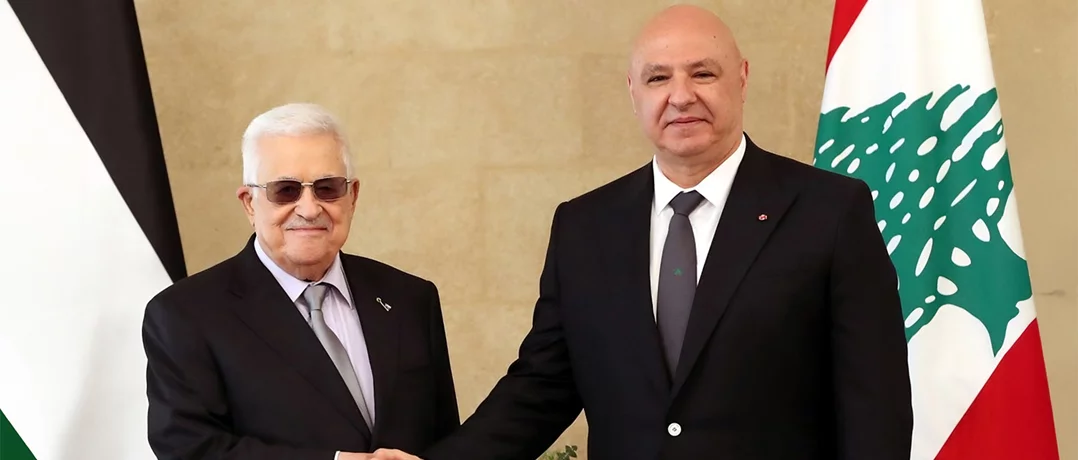In May 2025, Abbas and Aoun agreed to disarm Palestinian factions in Lebanon’s camps, aiming to strengthen state control while reflecting Fatah’s efforts to assert authority and distinguish itself from Hamas.
Abbas’s disarmament gamble: Fatah’s bid for Legitimacy in Lebanon
Abbas’s disarmament gamble: Fatah’s bid for Legitimacy in Lebanon

In late May 2025, Palestinian Authority (PA) President Mahmoud Abbas met with Lebanese President Joseph Aoun to announce a landmark agreement: the disarmament of Palestinian factions across Lebanon’s refugee camps. The joint statement declared an end to “weapons outside the control of the Lebanese state” and pledged that these camps would no longer serve as “safe havens for extremist groups.” On the surface, the move seems designed to bolster Lebanon’s fragile sovereignty. But beneath this rhetoric lies a calculated political maneuver, one that reflects Abbas’s struggle to reassert Fatah’s authority, project an image of moderation to the international community, and survive in the shadow of Hamas.
Official spokesman of Fatah Abdul Fattah Dula said: "After two years of extermination, destruction, and displacement that affected our people in the Gaza Strip, it would have been more appropriate for the "Hamas" movement to align itself with the will and higher interests of its people, rather than continue to turn its back on the tragic reality created by the coup and years of unilateral rule". These statements fall in line with Fatah’s strategy of distancing itself from Hamas, a strategy well adopted on the Lebanese scene.
Trump’s recent plan unveiled in Egypt stipulates an essential condition: no role for Hamas whatsoever in the governance of Gaza. Building on that is Fatah that strives to claw its way back into the Palestinian picture by showcasing a political trajectory that stands in stark contrast to that of Hamas.
Extending that approach to Lebanon represents a continuation of Abbas’s pragmatic, some would say desperate, efforts to contrast Hamas’s militancy with Fatah’s governance. The timing is no coincidence: following the October 7 attacks, Fatah’s leadership aims to demonstrate that an administrative, non-militarized Palestinian alternative still exists, and Abbas being present at the Sharam Al-Sheikh peace conference is telling of that.
Disarming Palestinian factions in Lebanon offers a rare opportunity to showcase himself as the responsible custodian of Palestinian interests. As discontent over his leadership deepens in the West Bank and diaspora, this move appears to be less about Lebanon’s internal security and more about international optics. By signaling a readiness to disarm, Abbas presents himself to Western and Arab capitals as the only Palestinian leader willing to place state sovereignty and stability above armed resistance, a message tailored to secure renewed political and financial support.
The context within Lebanon makes the decision particularly fraught. The country’s twelve Palestinian camps, home to roughly 200,000 people, contain several thousand-armed fighters affiliated with various factions. Although Fatah retains nominal authority over some of these camps, Hamas and Islamic Jihad have grown increasingly influential, often with backing from Hezbollah and Iran’s Islamic Revolutionary Guard Corps-Qods Force.
Abbas’s disarmament initiative thus fits into a larger regional shift. Lebanon’s decision would mark a critical step in dismantling the remnants of the “Palestinian Rejection Front,” the coalition of groups historically opposed to peace with Israel. As Mustafa Abu Harb, a Fatah official acknowledged, “We do not accept weapons in the hands of anyone other than the Lebanese state”. Yet the obstacles remain formidable as few are willing to trust that the Lebanese state will, in turn, protect them.
Many factions view disarmament with suspicion, haunted by the failed promises of the 1991 agreement in which Yasser Arafat’s PLO handed over heavy weapons to the Lebanese state. Palestinians in Lebanon never received the civic rights they were assured that include property ownership, labor permits, or social security, and have since lived in legal and economic limbo. For them, surrendering arms again without firm guarantees would amount to major political losses.
Complicating matters further, Fatah’s internal cohesion has eroded. Prominent camp commanders, such as the Miqdad brothers in Ain al-Hilweh, have effectively shifted allegiance to Hezbollah and Iran’s Qods Force. Majdi Majzoub, a community leader in Beirut’s largest Palestinian camp said to Al Jazeera “this president (Abbas) doesn’t honor us and doesn’t represent us because he supports the occupation and adopts the occupation’s decisions.”
Hezbollah’s own calculus will also determine the outcome. Ghaddar and Yaari (2025) with The Washington Institute for Near East Policy claim that Hezbollah has long used Palestinian factions as proxies to pressure Israel and Lebanese rivals. On the other, encouraging defiance of the Lebanese state would further inflame public anger and risk dragging Hezbollah into an internal confrontation it seeks to avoid. For now, procrastination seems the likeliest course.
Ultimately, Abbas’s initiative is as much about optics as it is about security. By handing over the weapons, he signals moderation to foreign donors and Arab governments while hoping to improve Palestinian refugees’ living conditions. If he can secure Lebanese consent to implement long-delayed reforms on refugee rights, his leadership could gain a temporary reprieve.
For Lebanon, the effort to bring all weapons under state control could be a step toward sovereignty. For Abbas, it may be a final attempt to remind the world, and his people, that Fatah are still in competition for the mantle of Palestinian legitimacy.


